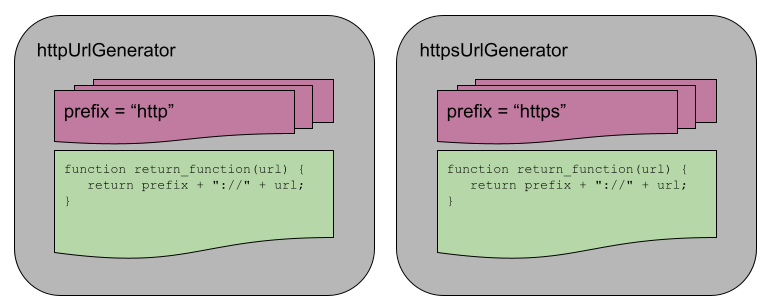10/29/2021
No one Puts Locals In a Corner
One of the really cool things about functional programming languages is their first-class support for functions. In functional programming languages, the programmer can pass functions as parameters to other functions and return functions from functions. Let’s take a closer look at functions that “generate” other functions. JavaScript has the capability to return functions from functions so we’ll use that language to explore:
function urlGenerator(prefix) {
function return_function(url) {
return prefix + "://" + url;
}
return return_function;
}
The urlGenerator function takes a single parameter – prefix. The caller of urlGenerator passes the protocol prefix as the argument (probably either “http” or “https”). The return value of urlGenerator is itself a function that takes a single parameter, a url, and returns url prepended with the prefix specified by the call to urlGenerator. An example might help:
const httpsUrlGenerator = urlGenerator("https");
const httpUrlGenerator = urlGenerator("http");
console.log(httpsUrlGenerator("google.com"));
console.log(httpUrlGenerator("google.com"));
generates
"https://google.com"
"http://google.com"
In other words, the definition of httpsUrlGenerator is (conceptually)
function httpsUrlGenerator(url) {
return "https" + "://" + url;
}
and the definition of httpUrlGenerator is (conceptually)
function httpUrlGenerator(url) {
return "http" + "://" + url;
}
But that’s only a conceptual definition! The real definition continues to contain prefix:
return prefix + "://" + url;
But, prefix is locally scoped to the urlGenerator function. So, how can httpUrlGenerator and httpsUrlGenerator continue to use its value after leaving the scope of urlGenerator?
The Walls Are Closing In
JavaScript, and other languages like it, have the concept of closures. A closure is a context that travels with a function returned by another function. Inside the closure are values for the free variables (remember that definition?) of the returned function. In urlGenerator, the returned function (return_function) uses the free variable prefix. Therefore, the closure associated with return_function contains the value of prefix at the time the closure is created!
In the example above, there are two different copies of return_function generated – one when urlGenerator is called with the argument “http” and one when urlGenerator is called with the parameter “https”. Visually, the situation is

Connections with Other Material
Think about the connection between closures and the format of the urlGenerator/return_function functions and other concepts we’ve explored previously like partial application and currying.